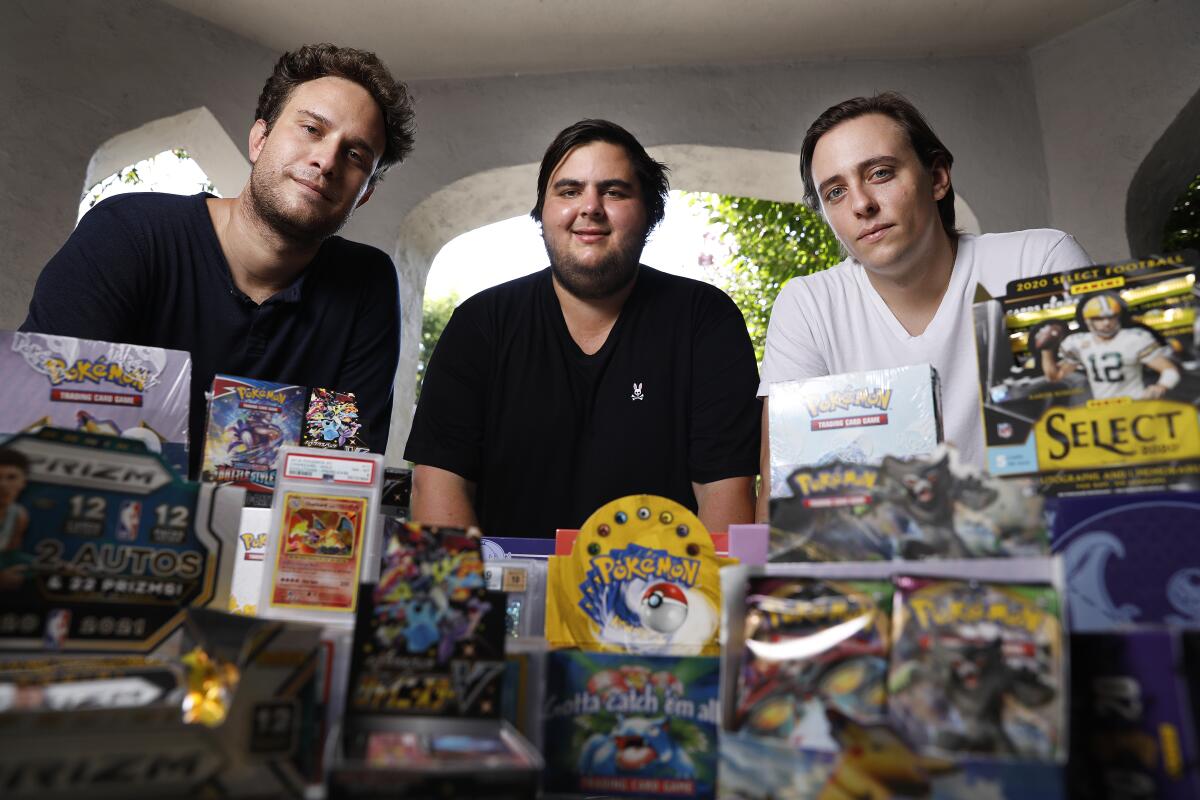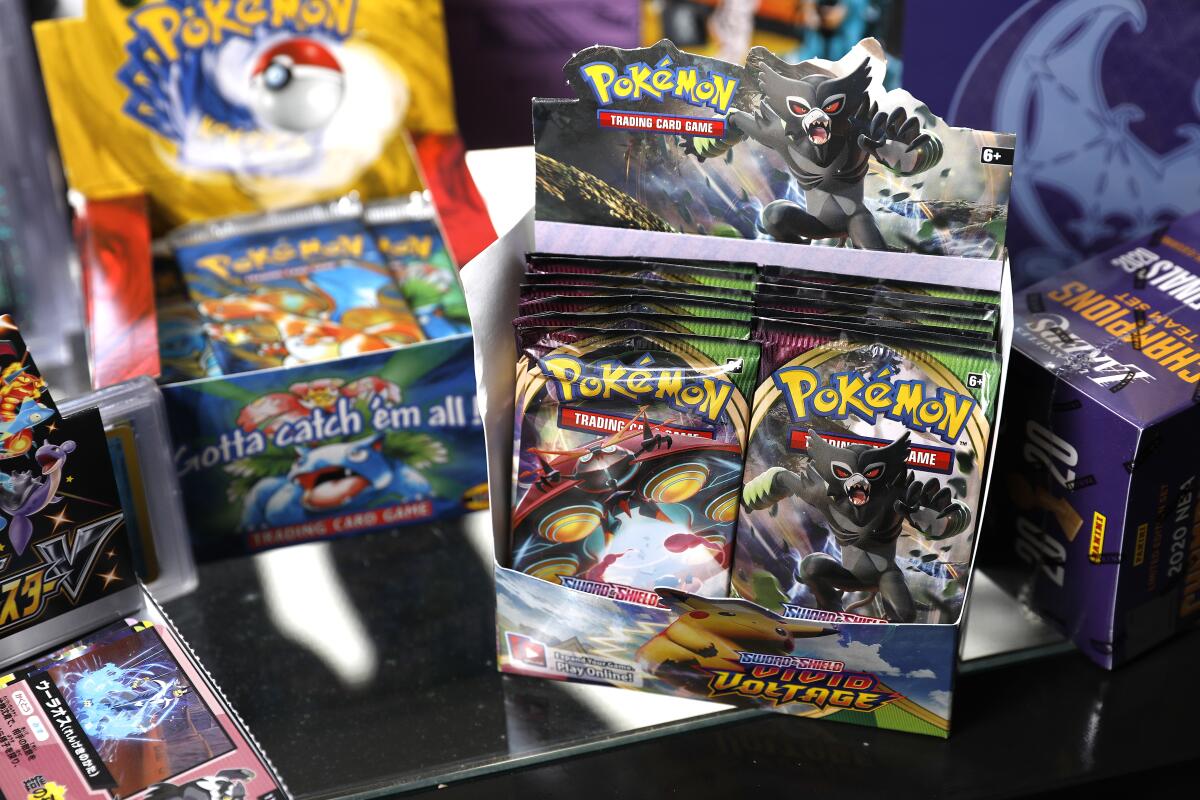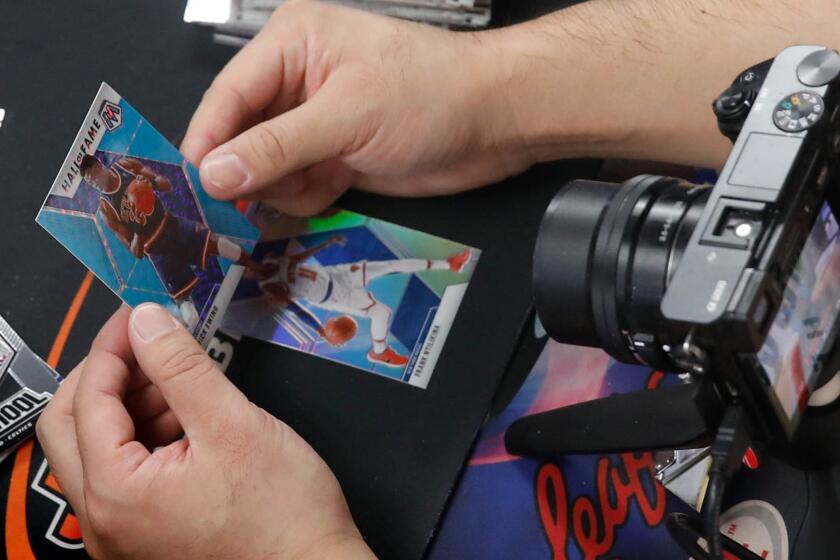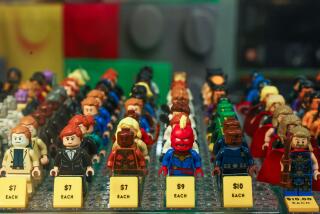Pokémon cards are making collectors serious cash. Some people are upset about it

- Share via
Anthony Jimenez hadn’t thought much about his Pokémon cards since middle school, when girls suddenly seemed more interesting.
But with time on his hands during the pandemic, Jimenez dug out his old collection and found that the cards were in pristine condition, a fact that would change his life and financial outlook.
“When I found my old Pokémon cards, it was like, ‘Oh my God, these are skyrocketing in value. I should try to sell some of them,’” Jimenez said. “So we decided, just for fun, to try this out because L.A. was shut down, and we literally had nothing to do.”
Jimenez, 27, has kept his day job doing marketing for a West Coast tech giant. But he’s sold enough new cards and some of his old collection to fuel a lucrative side gig — Tony’s Collectibles — that he runs live on Instagram on some nights with two childhood friends. It’s been clearing an average of $6,000 per show.
The pandemic inspired a surge in the buying and selling of all manner of collectibles, from traditional fine art, rare coins and currency to newer crazes such as Pokémon cards and street art. It’s the kind of commerce that normally relied on brick-and-mortar stores and large, in-person events, but it has managed a relatively smooth transition to online events run by newcomers like Jimenez and venerable firms like Stack’s Bowers Galleries, founded in 1933.
“We have seen a record number of new clients coming into the market,” said Brian Kendrella, president of Stack’s Bowers Galleries, which recently auctioned an 1804 Draped Bust silver dollar for $7.68 million, making it the fifth-most valuable United States coin ever sold. “We’ve really seen it across all asset classes.
“These are new clients at an entry level from a price point perspective as well as at a highly advanced level that are spending six figures and beyond,” Kendrella said.
The demand explosion has increased scarcity and injected a bit of chaos into the collector industrial complex.
Professional Sports Authenticator has been hit with an “avalanche of cardboard” from collectors seeking out the authentication and grading company for a third-party evaluation of their trading cards, President Steven Sloan said.
The crush forced the Santa Ana firm in April to temporarily stop accepting new submissions while employees worked through the backlog. In a July update, the company said it and parent Collectors Universe have been hiring “at a phenomenal pace” to shrink the backlog.
“We recently received more cards in three days than we did during the previous three months,” Sloan said in a statement on the company’s website. “Even after the surge, submissions continue at never-before-seen levels,” he said.

Some Walmart stores pulled their Pokémon cards after collectors and resellers rushed brick-and-mortar locations, creating scenes reminiscent of a Black Friday shopping frenzy. Big B Cards tweeted a video of one such brawl on May 21 that has received more than 1 million views.
Also in May, Target said that it was suspending in-store sales of Major League Baseball, National Football League, National Basketball Assn. and Pokémon trading cards after a fight broke out in a Wisconsin store parking lot.
Police told ABC affiliate WISN that four men allegedly confronted a fifth and demanded the box of trading cards he was carrying. The fifth man pulled out a gun, and the assailants fled but were arrested nearby, police said. The cards are still available on Target’s website.
Some parents are upset that they are unable to buy their children Pokémon cards because of high online prices after resellers beat them to the available supply in retail outlets.
A mother who identified herself on Yelp as Fatima D. of Cerritos gave a one-star review to a Southern California trading-card business, but her rating had nothing to do with poor service.
“It’s people like them who make it so hard for CHILDREN just to get Pokémon cards and enjoy it,” she wrote. “You guys are so greedy!”
Part of the boom can be explained by increased disposable income and idle time for some people lucky enough to keep their jobs but work remotely during the pandemic, experts said.
The collecting increase also is an emotional response to coronavirus lockdowns without precedent in living memory. Stay-at-home orders left people feeling more isolated than ever before. At a time when it was difficult to meet with people, activities built around collectibles presented an opportunity for people to bond over items that give them pleasure.
“In times of stress like these, we are sort of biologically programmed to try to hold on to things, and to acquire things,” said Bradley Klontz, a psychologist and author. “Collectibles has the word in it. ‘I’m going to collect things and surround myself with things.’ And I think that’s a survival instinct at work.”
Amid the COVID-19 pandemic, the business of opening packs of sports cards online is surging, as customers shut out of hobby shops seek out the thrills of collecting — and the profits.
Collector and appraiser Ronnie K. Pirovino points to too many Zoom meetings and too much binge watching, which left people searching for something else.
“I truly feel we can point to the amount of free time people had for reflection to allow for a certain escapism to take place and allow them to revisit some things that they may have had been interested in the past and to see how they might be able to participate in some of that again,” said Pirovino, a fine art member of the International Society of Appraisers who has served as an expert consultant to well-known auction houses including Christie’s, Sotheby’s and Bonhams.
Pirovino once owned one of the largest collections of art toys by Kaws, the moniker used by American artist and designer Brian Donnelly. But in recent years, Pirovino has redirected his collecting “with a much more personal narrative,” selling his figurines for “many millions of dollars.”
As an investment, collectibles aren’t guaranteed to hold value, as anyone who bought into the ‘90s-era Beanie Babies mania can tell you.
An analysis by Credit Suisse in October found that indexes tracking high-end collectible value gained across most categories, with varying degrees of volatility: “On aggregate, wines and fine art have returned the least. Watches and jewelry have been effective stores of value, with cumulative 10-year returns between 27% and 61%. Classic cars were by far the best-performing collectibles category.”
In a note to clients, Credit Suisse Group Chairman Urs Rohner wrote: “Given the uncertainty created by the COVID-19 pandemic and some concern about the sustainability of economic policies precipitated by the crisis, collectibles can add an extra dimension to investors’ portfolios by helping to diversify asset allocation and provide an element of safety.”
Sneaker reseller GOAT has a fresh cash hoard with plans to expand, taking its founders well beyond their idea of origin into luxury designer apparel.
For Jimenez, a little research into his collection’s worth prompted him to reach out to friends.
“That set off the chain reaction of them looking through their basements and trying to find their Pokémon cards,” he said. “And I think that’s how it happened for a lot of people in the last year.”
And that’s a big part of the collecting allure, said Jeff Figler, a certified sports memorabilia appraiser.
“Once somebody hears about some big sale that’s just out of this world, a lot of these people were saying to themselves, ‘Hey, I’ve got this stuff that I’ve had for years,’” Figler said. “And once somebody hears about some sale that’s just out of this world, then a million other people send their cards in and it’s just a domino effect. And they’re saying ‘pandemic or no pandemic, I’m going to cash in.’”
Rediscovering past hobbies like Pokémon card trading has become a pandemic-safe way to connect with old friends, said Karsen Woods, chief experience officer at 888 The New World, a digital art and NFT marketplace.
“Now that this is happening in more of this digital atmosphere or environment, whether it’s through collecting sneakers or toys, you’re still connecting with people through apps and social media,” Woods said. “You really are creating this opportunity to align with like-minded people and share something and share the capturing of that culture.”

To collectors like Dil-Dominé Jacobé Leonares of Los Angeles, the difficulty finding cards is just part of the attraction.
“Part of the thrill is just opening up a new pack of trading cards with friends, looking for the really rare and collectible items and then you pull out one that is really valuable,” Leonares said.
“Everyone just starts freaking out over it. That energy really drives the enjoyment. I mean, who knew that us Gen Ys were prone to getting this excited about trading cards?”
The 37-year-old recently founded a business called Vccess, the New Wave of Fandom. Vccess (pronounced access) gives creators the tools to control the release of their intellectual property, in the form of physical and digital collectibles, he said.
In Apri, Leonares partnered with rapper M.I.A. to auction off a digital collectible called the Kizhi Coyn, which was a repeating graphic image with audio attached, at a fundraiser for the victims of the volcanic eruption earlier this year on the Caribbean island of St. Vincent. Leonares said the auction raised more than $254,000.
“People have this [disposable] income just because they weren’t going out or there was nowhere for them to go and very little to experience, but having things that they can have in their hands at home and unboxing these cards and opening up the blister packs is an experience for them to enjoy and kind of take their minds off of what was going on during like the COVID era,” Leonares said.
But as a collector, Leonares said he’s also suffering from the boom in terms of the authentication and grading backlog.
“I think I have about maybe a hundred cards ... that still have yet to be graded,” he said. “I have two Pokémon Charizards that are super rare. If they’re authentic and if any are nine or 10, then I’d probably put them on sale. I’ll just have to wait and see.”
More to Read
Inside the business of entertainment
The Wide Shot brings you news, analysis and insights on everything from streaming wars to production — and what it all means for the future.
You may occasionally receive promotional content from the Los Angeles Times.













